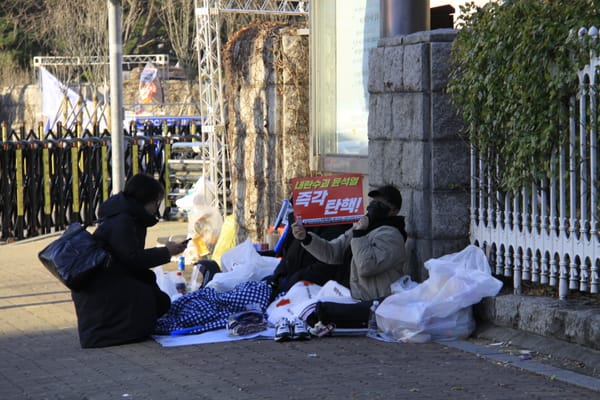Asia Undercovered Round-up: 15 March 2022
This week: Election results in South Korea and India, no more nine-dash line, and hope for framers in Bangladesh.
Undercovered last week
It’s a little incredible how little attention this horrific news got. A huge suicide bombing killed 58 people at a Shi’ite Mosque in Pakistan, with the Islamic State claiming responsibility (Rappler).
Worth reading: From veteran Uyghur journalist Kok Bayraq, who writes about seeing the Winter Olympics take place even as his people are subject to genocide. He calls it a funeral taking place alongside a wedding – something that should have happened (Global Voices).
Another sign of growing repression in Indian-controlled Kashmir – a journalist, Sajad Gul was arrested by police for publishing a video on Twitter of a protest in which demonstrators shouted anti-Indian slogans (IPI).
I’m tired of reporting on Indonesia’s new capital through a narrow “sinking city” climate lens, so was happy to see this feature by Fadhilah Fitri Primandari and Sahnaz Melasandy for New Naratif that looks at the move as a colonial project, that would impacts the rights of indigenous people in Kalimantan/Borneo, and their environment.
In Myanmar a Chinese pipeline has been damaged in an attack, a sign that Chinese-backing for the military dictatorship may be resulting in rising anti-China sentiment (Sebastian Strangio, The Diplomat).
Meanwhile, refugees and those in exile from Myanmar – disproportionately from non-Bamar regions – has grown significantly since the coup. This piece by Johanna Son explores this community and how they stay connected to the fight for democracy even from afar (Reporting Asean).
A horrifying case of slave labor – a district head was detaining as many as 40 people in North Sumatra Indonesia and forcing them to work, for free, on his oil palm plantation. It’s people across the country. Wahyu Susilo looks at this case in context of how forced labor has been used on plantation since the colonial era (Indonesia @ Melbourne).
Electoral Politics
Lot of election results last week. The biggest race was for President in South Korea, where in nail-bitter, conservative opposition candidate Yoon Seok-youl won.
For background on the Korean election, check out our News Backgrounder.
Here’s a take on why the ruling party lost their mandate.
Meanwhile, in critically important state elections in India, Narendra Modi’s right-wing BJP won four out of five states, a strong sign of its renewed strength ahead of national elections scheduled for 2024 (Shoaib Daniyal, Scroll.in).
Geopolitics
A new, perhaps important change – according to Malaysia’s foreign ministry, China is shifting away from the nine-dash line towards the “four sha,” the four island groups in the South China Sea that Beijing claims to hold “historical rights,” to assert its marine claims (RFA)
Also of note: Engage Media has put out a multipart series on the geopolitics of Artificial Intelligence in Southeast Asia, focusing on the rise of China and the impacts on regional governance. I expect this will become a bigger issue with time.
Solutions Stories
Very much enjoyed this wonderful story from Smita Kundu for The Third Pole on how farmers in Bangladesh are shifting away from tobacco to grow tea, sunflower, and mustard – all of which are more drought resistant and offer greater profits.
For Atmos, Agnee Ghosh takes us to India’s sundarbans, home to Bengal tigers, to meet widows who protect the mangroves forests that their husbands died in. It’s a moving, visually stunning, and powerful story of hope.
Asia Undercovered: Round-ups and in-depth analysis of the news, events, trends and people changing Asia, but not getting enough attention in the US media.
Read more about this newsletter. If you like it, please subscribe.



